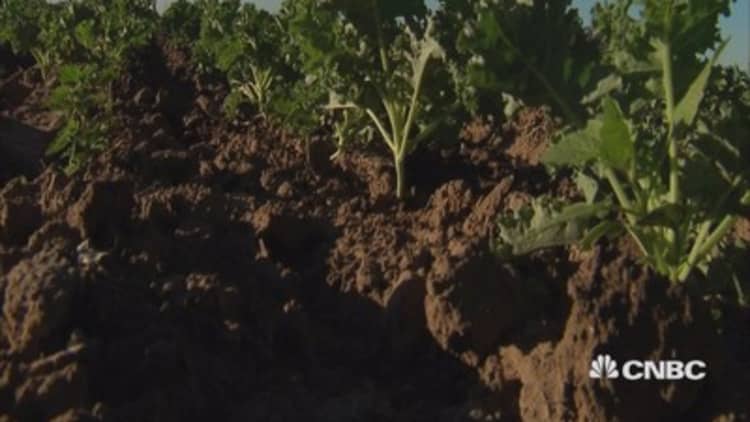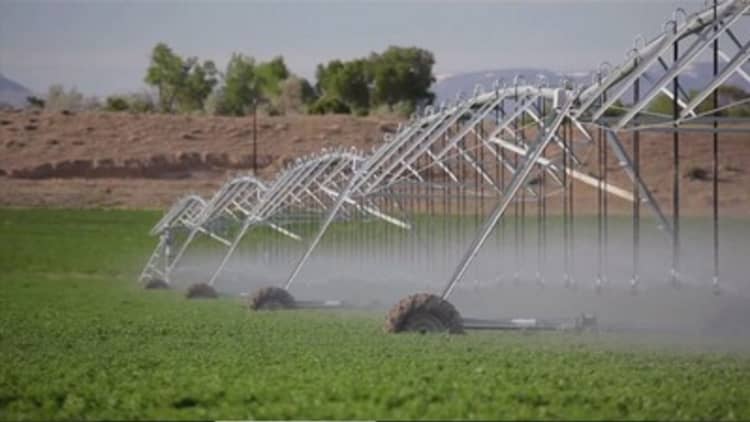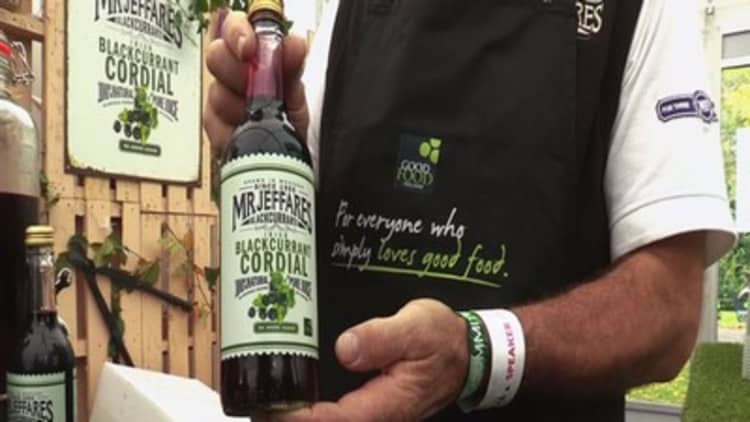
On a foggy morning in Napa Valley, California, Tim Cheng is walking through a vineyard surrounded by California's classic golden hills. He bends down to look at one vine.
"Is the webbing from the mealy bug?" he asks Debby Zygielbaum. She manages soil health for Robert Sinskey Vineyards, an organic winery on Napa's Silverado Trail. Zygielbaum has been fighting the mealy bug with a blend of pheromone traps and beneficial predators. "When we first got infested, we lost 25 percent of the crop," she said. "Now you can hardly find them."
Cheng is an accredited organic certifier, but he doesn't work directly for the USDA. He is a third-party contractor for California Certified Organic Farmers (CCOF). There are an estimated 24,000 certified organic farms and other operations in U.S. that need annual audits, and even more outside the country. Meanwhile, there are only about 80 accredited agencies — some for profit, others nonprofit — that are doing the work for the USDA to certify that products from Whole Foods, Walmart, farmers' markets and elsewhere deserve the government's organic seal of approval.
It's big business. The Organic Trade Organization claims total food and non-food organic sales last year topped $39 billion. Organic food now accounts for nearly 5 percent of all food sold in the United States, an amazing milestone considering that it's more expensive than food that isn't certified as organic.
Everyone wants in, with many conventional farmers now setting aside a portion of their property to go organic and cash in. "There's so much competition," said Garrett Nishimori of San Miguel Produce, which grows conventional and organic greens like kale and chard. "With the recent growing challenges with the drought, we've seen costs rise and prices kind of come down."
Some are worried about how fast the industry is growing, and whether there's enough oversight. "Sadly, we can't trust the organic label right now," said Mischa Popoff, who used to certify organic farms.
What does "organic" mean?
To become certified, a farmer must start with land that hasn't grown anything conventionally for three years, a transition that can be costly. Farmers are not supposed to use synthetic pesticides or herbicides (though the USDA still allows a few), no genetically modified seeds, and they must meet other standards set out by the government's National Organic Program.
The farmer has to provide a plan and a paper trail to a third-party certification inspector who also does annual audits. These audits usually consist of going over receipts and other paperwork, and often a check of the farm itself.
Rarely does it mean gathering actual soil samples or testing products for things like pesticide residue.
Read MoreGirl Scout cookie prices jumping to $5 here...
"We, as an organic certification agency, are required to perform testing (for) chemical residue (in) at least 5 percent of our operations," said Jake Lewin, president of California Certified Organic Farmers. "We have broad discretion about whether or not we test finished products, whether we test soil or plant tissue." He said his organization does about 140 "surprise" inspections a year in addition to normal audits.
Lewin said most of the errors he finds are honest accidents by the farmer. "I think it's really a mistake to make the assumption that the system is full of cheaters, there's no evidence for that." However, he said about once every 18 months he recommends that someone lose their organic certification, at least temporarily. "There are always going to be cheaters in any system, whatever it is. We're out there working to address it."
Popoff said he never did any surprise inspections during the time he audited about 500 organic operations in the U.S. and Canada. "We never show up like health inspectors do in the restaurant business," he said. He pointed to a USDA study of hundreds of organic products tested on store shelves five years ago. More than 40 percent came back positive for pesticides, though only a few had residue levels that violated federal standards. "The reason why they found those abysmal results," Popoff said, "is because we're not doing the inspections on the front end, we're not doing them in the field."
Everyone admits the system depends heavily on farmers being truthful, though growers say they've experienced surprise inspections.
"There are things that can be done, like they do testing to make sure there aren't residues and things, but when it really comes down to it, it's an honor system," said Zygielbaum.
"They can do a surprise inspection any time they want," said Robin Taylor, an organic farmer who co-owns of Suzie's Farm in San Diego. Taylor said he's been subjected to a surprise inspection in the past.
Nishimori said he's had San Miguel Produce's soil tested. "There's a lot of audits, there's a lot of verification," he said. "I think having that verification is important, but you also have to trust the farmer."
Who's paying the certifier?
Farmers pay the inspectors to be certified.
"You're essentially paying your policing body to certify you," said Popoff. "You can see if they decertify you, well, they're not going to get their $3,000 out of you next year, and by the way, that could be $30,000 upfront. It depends on the size of your operation."
A story in The Wall Street Journal last year said that a USDA review of accredited certifiers found that nearly half failed to uphold at least one standard.
Chenglin Liu, who teaches law at St. Mary's University in San Antonio and grew up on a farm in China, said the entire system needs an overhaul. He even goes so far as to suggest the USDA should be in charge of certification instead of third party contractors. "The USDA sends its employees, 8,000 of them, to the meat plant to certify that particular product to the federal standards," he said. "The U.S. organic market is so big ... the government is obligated to take good care of this market and regulate it in a way that is trustworthy. The current system is not up to the job."

Lewin said his certifiers work hard every day to do a good job, and it is appropriate for farmers to pay the cost of certification. "An organization like CCOF would never trade its reputation or integrity for any single certification, or any group of them, frankly. We have too much at stake."
Taylor pointed out that third-party inspectors are also subject to inspection by the USDA. "I've seen people get thrown out of this certification process before," he said. "One of my certifiers that was certifying me got thrown out at one point. I never know what they did, but they got thrown out by the USDA."
What about foreign food?
All foreign food imported to the U.S. as "certified organic" must meet the same standards that domestic growers face. However, foreign certification usually happens in the country of origin by foreign agents. One farmer said off camera that he'd much rather eat food grown non-organically in the U.S. than anything declared organic from China.
"I've been to those farms," he said. "They're a dump."
Liu said 100 countries export organic food to the United States, "from Afghanistan to Zimbabwe," but enforcing penalties on foreign violators is tough.
"Will a foreign judge sentence a farmer who violated a U.S. law in their own judicial system? That's just not plausible," he said. He said it's important for consumers buying organic to look at where a product came from.
Popoff agrees. "If you're dealing with a domestic product, there's a much higher likelihood that it's on the up and up."
Is the USDA in bed with big agribusiness?
Mark Kastel, co-founder of The Cornucopia Institute, is angry. "We've had a full frontal assault by corporate agribusiness that's decided to invest in organics," he said last month at the meeting of the National Organics Standards Board, a group appointed by the USDA to develop standards for the industry.
His group, which promotes the "good food movement," is suing the USDA over the way it forms policy. The institute says the USDA favors large farming operations over small family farmers.
Read MoreYour next pint of Guinness could be vegan-friendly
At a board meeting in Vermont, Kastel accused the government of ignoring evidence Cornucopia gathered alleging that some large-scale organic chicken and cattle operations were violating rules. "Not one operation had any chickens outside," he said of one farm. He took particular aim at Miles McEvoy, head of the USDA's organic program.

"The majority of farmers are doing it right," Kastel said. "What our concerns are is the USDA is too friendly with corporate agribusinesses and really not doing a judicious job enforcing the law."
The USDA said in a statement that while it takes any complaints seriously, it looked into Cornucopia's allegations of farming violations and found insufficient evidence to conduct an investigation.
Next steps
The USDA is creating a new database for growers, and the organic standards board plans to remove some synthetic pesticides and herbicides still considered acceptable for organic growers to use.
Board Chairwoman Jean Richardson said the organic market is expanding and facing more challenges: "In the last five or almost 10 years there's been a radical increase in processed products, and that's been the biggest challenge for us, because when you start processing foods, you add more ingredients that may not be non-synthetic or pure agricultural."
She said another challenge is organic grain. Corn and soybean farmers in the U.S. are not growing enough organic feed to meet demand. That means that certified organic meat often comes from animals fed with what is supposed to be organic feed from China or India.
Still, she expresses confidence in "that little green seal" designating a food product as certified organic. "The consumer can absolutely be confident that the product and all of its ingredients has been thoroughly checked right from the carrot coming out of the field, from the product coming out of the processing plant, and getting into the jar of whatever it is that they've bought."
— CNBC's Alexandra Pournaras, Jill Silvestri and Heidi Chung contributed to this story.




